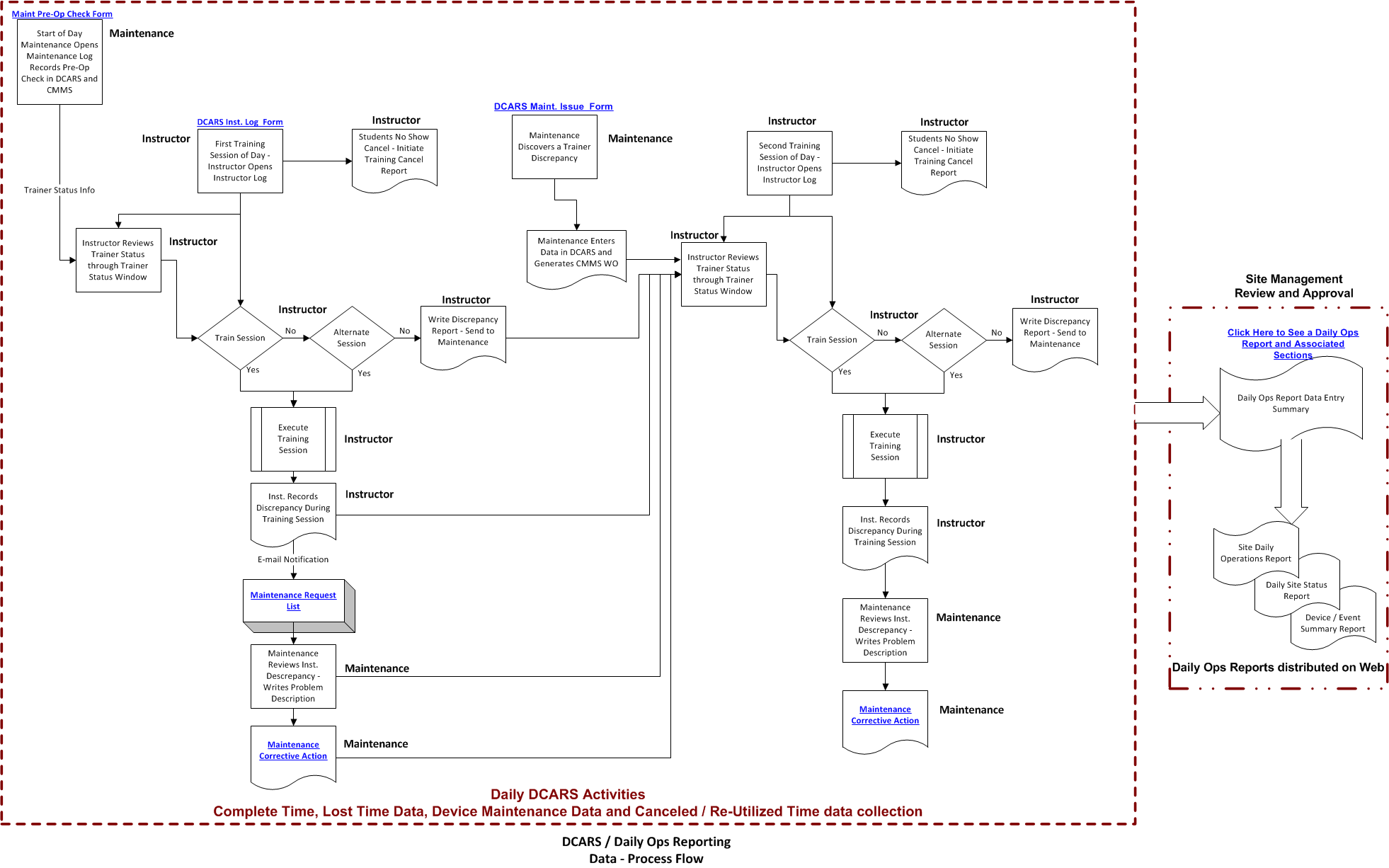
Data Collection Analysis & Reporting System (DCARS)
The DCARS collects a standard set of inter-related data from various information management system components used within every training system like the CMMS and TMS (Training Management System or Learning Management System). The DCARS analysis engine uses a foundation of Best Business Practice (BBP) performance assessment methodologies combined with a set of user predefined operational process benchmarks and process parameter values to monitor current operational capability. DCARS analysis results are available as “near real-time” available information along with the success bench mark and process parameter data that can be easily accessed via the DCARS reporting functions. This “near real-time” information gives managers and operational personnel the ability to quickly respond to and make the necessary operational adjustments needed to better control training system operational capabilities and costs, as well as, more effectively manage operational risks.
The DCARS reporting function uses both a single button report generation capability and a minimum criteria entry report generation capability. The single button reports provide quick views of standard information reports needed for daily operational management efforts. The minimum criteria entry generation reports provide an ability to review historical information within a set of standard performance and metric reports. The DCARS minimum criteria reports can be ran for any period of time and thus can provide real-time daily operational reports or historical performance reports that identify the past operational performance to a defined operational requirement or objective. This DCARS reporting function can be setup to provide Earned Value Management (EVM) reporting critical for management decision making.

Predetermined operational performance metrics and / or process parameter data nested within the DCARS by TSOM managers permits the DCARS reports to provide a quick identification of operational performance issues and then provide a drill down capability to identify the exact drivers of performance issues within more detailed informational reports.
The DCARS obtains scheduled or planned event information from the Training Management System (TMS) or Learning Management System (LMS) and actual executed event information from the TSOM Instructor Daily Training Log Management System (IDTL). An event can be training or other types of planned / scheduled activities required to be accomplished within a training system such as SIMCERTs, device development testing, Customer training device time, etc. The DCARS collects down time and maintenance related information from the logistics support and maintenance management systems (LSMS and CMMS) and combines this information with event lost time information from the IDTL.
The DCARS obtains device operational performance information from the LSMS / CMMS to identify and report various training device operational performance metrics such as availability, utilization, capacity usage and training delivery effectiveness as a result of training device performance. The training device performance data is combined with IDTL training delivery information to report on the overall operational performance of the training site and / or the training system. The DCARS combine with the LSMS, CMMS and IDTL information can provide the necessary information to support the Air Force 781 system or the DCARS can be setup to provide electronic reports in an Air Force 781 format.
The objective of the DCARS is to combine data from multiple systems into analytical information that can be provided as training device and training system operational performance reports. Predetermined operational performance metrics nested within the DCARS permits the DCARS reports to provide a quick identification of operational performance issues and then provide a drill down capability to identify the exact drivers of performance issues within more detailed reports.
The DCARS performance reports extend from training site and training device operational performance to maintenance and supportability performance factors which could affect the ability and capability of the training system to effectively deliver training as necessary to support training throughput requirements.
DCARS training delivery performance reporting provides an ability to identify where and when student throughput requirements are below planned training objectives. Drill-down reporting helps identify the root-cause reasons for the detriments in training throughput such as training device availability, logistics support and / or maintenance issues, system outages or unavailability due to device modifications or environmental problems and / or training schedule variances due to student or instructor resource issues.
Training systems typically perform more than just training. The DCARS tracks and reports on training and non-training events or activities thus providing a complete view and capability to manage all events or activities that must be accomplished within the training system. The DCARS provides an ability to identify what events were accomplished and what events were not accomplished along with the reason a specific event was not achieved as planned regardless of whether the planned / scheduled event was a training event or a non-training event.
The DCARS provides not only metric and performance reports but informational reports such as training system capacity to utilization; composition of utilized capacity to revenue training; on-time event delivery to alternate event execution; training program period accomplishments to system requirements; as well as device availability and training effectiveness factors.
When the TSOM IDTL is integrated with the DCARS; performance reports can provide detail or specific information regarding what training was actually delivered and what training was either cancelled or replaced with a different training event. This reporting capability identifies what planned event or training was cancelled and why, along with whether and with what or how the cancelled event’s planned time may have been reutilized. Detail drill down reporting capability provides more specific or detailed information regarding event cancellations and cancelled event reutilization reasons. Additionally supplemental informational reports identify whether or not the initially planned training / event was accomplished at a different time using different resources than originally scheduled. The DCARS working with the IDTL also captures and reports on how training system and / or training device operational time was reutilized if the originally planned training / event was not accomplished. The DCARS with the IDTL provides detail drill down capability so more specific and detailed information regarding event cancellations and cancelled event reutilization can be provided.
In addition to operational performance assessments, the DCARS can provide an identification of the total operational capacity and utilization of training devices and the overall training system. This utilization metric reporting provides a timeline of total utilization for training devices and training system capacities against a Training Delivery metric. The capacity utilization factors can be compared to training system throughput factors which are used to predict the current viable ability of a training system to meet throughput objectives. This comparative information can then used to adjust training system operational profiles to either utilize the capacity better or perform capacity utilization to personnel and logistics resource cost balancing optimizations in relationship to training throughput needs. As a part of the DCARS functionality the system can also identify and define when additional training devices and / or personnel and logistics support assets will be required as a factor of training system throughput needs using the Training System Cost of Ownership Prediction Tool (TSCOPT).
High-level view of DCARS process flow.
